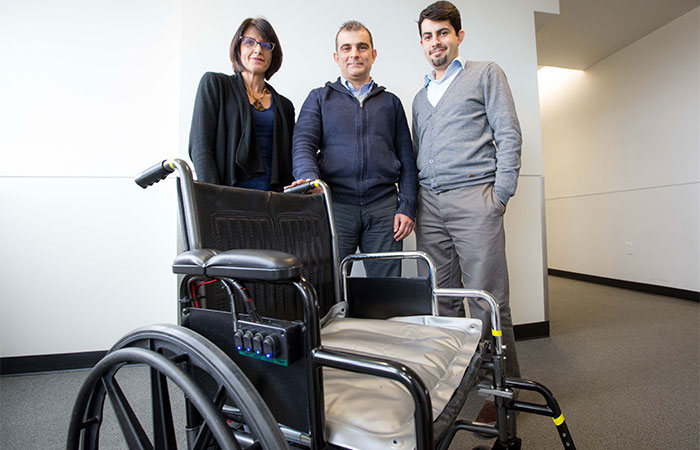A wheelchair cushion that prevents ulcers
By Alex Branch
A UNT Health Science Center researcher has developed a prototype of a cooling cushion that could help prevent pressure ulcers for people in wheelchairs.
The cooling system is designed to prevent skin temperature in the buttocks or lower back from heating to levels that accelerate tissue breakdown that occurs in ulcers, said Metin Yavuz, D.Eng, Assistant Professor of Physical Therapy.
Pressure ulcers are major health problem that impacts an estimated 3 million U.S. adults, according to the National Institutes of Health. Each ulcer typically costs between $37,000 and $70,000 to treat and often leads to pain, diminished function, infection and death.
People who are bedridden or in wheelchairs are particularly at risk because of the constant pressure against their skin and low-blood circulation at those pressure points.
“Pressure ulcers are dangerous to the patient and expensive to the health care system,” Dr. Yavuz said. “We need to find a way to offer these people more protection.”
A $5,000 NIH grant funded development of the wheelchair cooling system, which Dr. Yavuz designed with the help of Ali Ersen, Postdoctoral Research Associate, and Linda Adams, Research Associate.
The human body constantly generates heat, Dr. Yavuz said. For people seated in wheelchairs, that heat often is trapped between the body and wheelchair cushion, which is usually made of synthetic materials that act as a heat insulator. As the person’s tissue temperature rises, it causes increased sweating, which can lead to the breakdown of tissue.
Dr. Yavuz and his colleagues developed a battery-powered cooling system that circulates about a gallon of water through a wheelchair seat cushion. Studies suggest that a skin temperature range of 25 to 28 degrees Celsius (77 to 82 degrees Fahrenheit) can help prevent the breakdown of tissue that occurs in ulcers.
To achieve and maintain that temperature range, Dr. Yavuz and his team cool the water temperature in the cushion to about 13 degrees Celsius (55 degrees Fahrenheit).
“We’re excited by the potential of this project,” Dr. Yavuz said. “If we can find a way to reduce the incidence of these ulcers, we can help reduce a major health problem and improve the quality of life for people in wheelchairs.”
It’s not the first time Dr. Yavuz has worked to combat ulcers. He previously designed a self-cooling shoe for people with diabetes that controls the temperature of the skin tissue on their feet. He recently received a $225,000 NIH grant to continue development of the shoe and pursue clinical trials with his collaborators.




![Uyen Sa Nguyen Scaled[58]](https://www.unthsc.edu/newsroom/wp-content/uploads/sites/16/Uyen-Sa-Nguyen-scaled58-145x175.jpg)

Social media